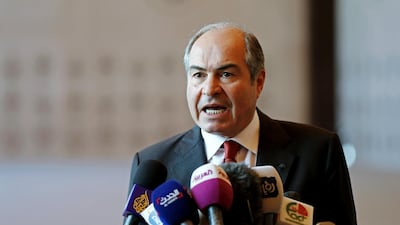Jordan's Prime Minister Hani Mulki resigned Monday following nationwide protests against increased austerity measures.
The embattled prime minister was summoned to a meeting with King Abdullah II on Monday following four days of anti-government demonstrations, which had called on the premier to resign.
King Abdullah accepted Mr Mulki's resignation and asked outgoing education minister Omar Al Razzaz to form a new government. Activists meanwhile vowed to keep protesting until the incoming government agrees to overturn austerity measures.
Across the country, thousands of Jordanians have protested against planned tax increases in what were the largest demonstrations in Jordan since 2011.
The immediate cause of public anger was a proposed law that would expand the tax base by lowering the income tax threshold. According to the IMF, 95 per cent of Jordanians do not pay income tax.
The proposed law, which was backed by the International Monetary Fund, followed austerity measures earlier in the year that saw the price of bread double and fuel costs rise significantly. Sales tax was also levied on hundreds of everyday goods ranging from Internet subscriptions to electricity and from soft drinks to stationery.
The reforms have been billed as painful but necessary in a country struggling to rein in its deficit. Nine per cent of Jordan's gross domestic product is spent on subsidies and the debt to GDP ratio is over 95 per cent.
But with unemployment above 18 per cent and poverty levels rising, the measures have gradually stirred widespread public anger.
______________
Read more:
Few easy options for Jordan’s incoming prime minister
Jordan's king freezes planned price increases
______________
“The government has made us penniless,” protesters chanted in the streets of Amman over the weekend. "They have left us with no more money in our pockets."
King Abdullah called a meeting of the National Policies Council on Saturday night and later sought to reassure Jordanians that he empathised with their situation. "I know how much Jordanians have endured," the Petra state news agency reported him as saying. "We are working day and night to overcome this difficult situation."
______________
Read more:
Jordanians down tools for national walkout over tax reform
Jordan's prime minister rejects demands to scrap tax law after protests
Jordan seeks ways to defuse anger over tax hike
______________
Jordanians welcomed Mr Mulki's resignation on social media but also said more needed to be done to change government policies. "People have became the victims of the government and the financial crisis," said Mutaz Shawarab, an activist at the professional associations, who took part in the protests. "We do not want just a change of government but the way it governs. Can the new prime minister fight entrenched corruption?"
Amateur footage from the demonstrations has been widely shared across social media, showing that the protests so far have remained largely peaceful. But neighbour Syria's ongoing civil war is a constant reminder to Jordan's leadership of the potential for demonstrations to get out of hand.
Protesters praised the police and gendarmerie for their disciplined behaviour at demonstrations so far, Jordan's largest privately-owned newspaper Al Ghad reported.
Minor clashes with police have occurred in some areas, with protesters blocking roads and burning tyres. The head of Jordan's Public Security Department said 60 protesters have been arrested so far for rioting and vandalism.
Mr Mulki, a business-friendly politician, was appointed in May 2016 and given the responsibility of resuscitating a flat-lined economy and reviving business confidence that has been dented by ongoing regional turmoil.
Mr Al Razzaz, who has been tasked with forming a new government, is a former World Bank economist.
It is not yet clear whether Mr Mulki's resignation will quell public anger, and some analysts have questioned whether it will improve Jordan's situation.

